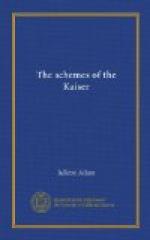Three months ago Von Moltke declared that he and Bismarck would live long enough to be able to say “Farewell to the Empire.”
On the other hand, Von Puttkamer seems to be regaining something of favour, and Prince Battenberg has been welcomed to the old Castle; strange plans concerning him are being hatched in the brain of William II.
Prince Henry has been brought back, ostensibly to take part in the Councils of the Government, but in reality that he may be watched the more closely. He also has received a letter in which he is publicly thanked for the services he has rendered. If I were in his place I should be very uneasy, seeing the kind of brother that he was, the most changeable the most jealous, and the most suspicious of men. There is a false ring about this letter to Prince Henry, just as there was in those which the Emperor addressed to Count Waldersee and to Bismarck. Gratitude is a word that William often thinks fit to use, but it is a sentiment that he is careful never to indulge in.
It is impossible to discover any sign of a heart in the actions of the German Sovereign. One may therefore predict that he will continue to show an ever increasing preference for distinguished personalities, whom it may please him to destroy, or creatures who would be the butts of his malicious sport, rather than to encourage the kind of public servants who strive continually to increase their efficiency, so as to serve him better. Instead of being simply good and ruling benevolently, he aspires to be first a sort of pope, imposing upon his people a social state composed of servility and compulsory comfort, and again a leader of crusades, drawing his people after him to the conquest of the world.
Spiritual and material interests, military organisation, he mixes and confuses them like everything else which occurs to his mind, and every day he does something to destroy the results of that marvellous continuity, which did more to establish the power of William I than the victories of Sadowa and Sedan. Ever more and more infatuated with the idea of military supremacy, he now pretends to be greatly concerned with the idea of disarmament. And he, the avowed protector of socialists, looks as if he were about to accept from Mr. Dryander, the protestant presidency of that association of workmen, which is being organised for the purpose of fighting socialism.
Wherever we look, it is always the same, false pretences, trickery, lying, love of mischief-making and of persecution, innumerable and unceasing proofs given by William that his sovereign soul, irretrievably committed to restless agitation, will never know the higher and divine joys of peace.
March 1, 1891. [3]
For some months past, my dear readers, I have predicted that William II will not be satisfied without paying a visit to France. The visit of the Empress Frederick should have prepared us for this amiable surprise. But because the august mother of the German Emperor was received by us with nothing more than cold politeness, the Cologne Gazette gives us a sound drubbing, as witness the following—




